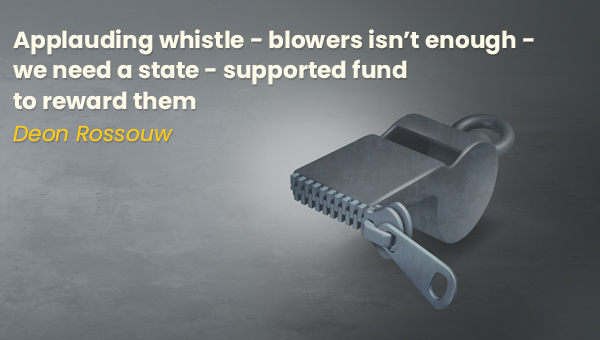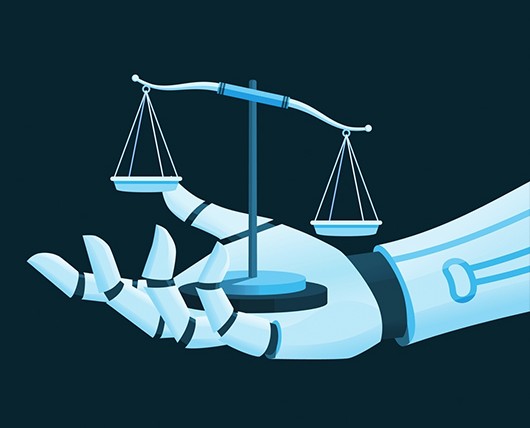The fate of whistle-blowers is well documented, as is the clear pattern that follows their disclosure: Organisations tend to retaliate against whistle-blowers, rather than protect them.
Whistle-blowers played a key role in exposing fraud and corruption in both private and public sector organisations involved in State Capture. Without the vital information disclosed by whistle-blowers, the exposure of the extent of State Capture by, initially, the previous Public Protector and later by the Zondo and other commissions of inquiry would have unfolded much more slowly and in much less detail.
We owe these whistle-blowers deep gratitude for what they have done — often at huge personal cost. And we need to applaud them for what they have done. But we owe them more than just gratitude and applause.
It is not always clear what drives whistle-blowers to expose information about wrongdoing that they have encountered. In most cases, whistle-blowers are driven by ethical considerations, but there are also cases where people blew the whistle for self-interested or less noble reasons — the Angelo Agrizzi case comes to mind. Speculating about the motives of whistle-blowers is a fairly futile exercise.
Although the motives of whistle-blowers may not always be clear, there is a clear pattern in what tends to happen with whistle-blowers once they have blown the whistle. And that is the real tragedy of whistle-blowing.
Often organisations tend not to listen to the message that the whistle-blower wishes to convey, but rather opts for shooting — sometimes literally — and often firing the whistle-blower.
The fate of whistle-blowers is well documented in academic research and more popular books and media articles. The pattern is clear: organisations tend to retaliate against whistle-blowers, rather than protect them. That is why whistle-blower legislation that attempts to protect whistle-blowers against retaliation can be found in so many countries — and also here in South Africa in the form of the Protected Disclosures Act.
Despite the best of intentions behind such whistle-blower protection legislation, the law seems to be incapable of preventing whistle-blowers from suffering retaliation, harm and often devastation.
A common pattern that can be seen in what typically happens to whistle-blowers is that they are first threatened by those implicated in their whistle-blower reports. This can either take the form of legal threats, intimidation, demotion, marginalisation or dismissal. This inevitably results in a legal tussle between the whistle-blower and the affected organisation. However, the legal battle is not fought on a level playing field. Very often organisations have deep pockets to hire the best legal minds, while the whistle-blower has rather shallow pockets, or might soon be out of pocket. The legal costs might — and often are — too high for the whistle-blower to afford.
And then there often are also high personal costs imposed on the whistle-blower. Whistle-blowers not only tend to lose their jobs, but also battle to find new jobs, simply because other employers are hesitant to hire a person who has caused their previous employers a lot of trouble.
Whistle-blowers not only have to bear the brunt of high legal costs and the loss of income, but the way they are treated by their (former) employers and by society leaves psychological scars that might result in mental illness and, in some cases, post-traumatic stress disorder (PTSD). This in turn might cause havoc in their personal relations and lead to the disintegration of family relations or end in a divorce. Often the cost of being a whistle-blower becomes almost, if not totally, unbearable.
That is why whistle-blowers need more than our applause. I believe we owe them more as a society because it is often their acts as whistle-blowers that prevent further harm to organisations and their communities.
One way of assisting whistle-blowers would be to ensure that they do not suffer financially because of whistle-blowing. In some jurisdictions — and notably in the US — there is legislation that provides for the remuneration of whistle-blowers. In terms of US legislation, whistle-blowers can under certain conditions be awarded a proportion of money recovered through the action of the whistle-blower.
The problem, however, with this approach is that certain acts of whistle-blowing are not related to money being squandered, but to damage to communities or the natural environment. Consequently, there would be no financial reward to whistle-blowers in such cases. It also raises the question of whether whistle-blowing should not be regarded as a civic duty, rather than as something that one should be financially awarded for.
The type of assistance that should be provided to whistle-blowers should not only be financial, but should provide much broader support. It should also include legal, psychological (and in some cases psychiatric), emotional and career support. Ideally, such comprehensive assistance should be provided by an organisation that can coordinate the various forms of support.
There are some examples of organisations that do provide some of these types of support to whistle-blowers.
The French organisation PPLAAF (Plateforme de Protection des Lanceurs d’Alerte en Afrique/Platform for the Protection of Whistle-blowers in Africa) does provide free legal, media and advocacy support to whistle-blowers. Although these services are provided free, there are substantial costs involved and therefore the organisation depends on support from other civil society organisations and donors.
The challenge of sustaining an organisation through donor contributions — or crowdfunding — is that donor sentiment and resources are fickle and can change quickly, which might leave the whistle-blowing support organisation — and ultimately the whistle-blowers — stranded.
Probably a more sustainable approach is the one behind the Whistle-blower Centre in the Netherlands. This support centre that provides whistle-blowers with advice and investigative aid was established through the Whistle-blowers Centre Act, and is funded by the state, but protected against state interference. Such an approach is safeguarded from the whims of donors or crowds, and therefore more likely to be sustained despite fluctuations in crowd or donor sentiment.
The detrimental experiences of recent whistle-blowers in South Africa have garnered support for the establishment of a local organisation that can render comprehensive support to whistle-blowers. The matter of funding such an initiative, however, remains a challenge.
The obvious immediate solution might be to rely on the goodwill of donors or the sympathy of people willing to provide crowdfunding for such an initiative. However, as indicated earlier, such funding is not reliable or stable.
The example of the Whistle-blowing Centre in the Netherlands, where the state provides the funding to support such an organisation without controlling it, is a model well worth exploring here in South Africa. There is no doubt that the state has a stake in promoting the reporting of misconduct in both the public and private sectors. By supporting such an initiative, the state would show its commitment to rooting out irresponsible, illegal and unethical conduct.
The state would furthermore be able to protect whistle-blowers against detrimental consequences that will far exceed the protection offered by the Protected Disclosures Act.
Expenses associated with providing such comprehensive a support service to whistle-blowers do not necessarily have to be covered by taxpayers, but a certain proportion of money recovered because of whistle-blowing can be channelled to a fund that covers the expenses of such support to whistle-blowers.
Applauding whistle-blowers is not enough. We carry a collective responsibility to protect them against the detriment associated with whistle-blowing, but also to assist them comprehensively in getting on their feet again.
Author: Prof Deon Rossouw is the CEO of The Ethics Institute and an Extraordinary Professor in Philosophy at Stellenbosch University.








Çeşmeler Musluklar ve Etik İkilem
Allianz’dan hediye kabul politikasının etkin ve inovatif bir uygulama örneği
İnsanlığa Adanmış Hayatlar
Veri İhlali Bağlamında Whistleblowing (Bilgi İfşası)
Allianz’dan hediye kabul politikasının etkin ve inovatif bir uygulama örneği